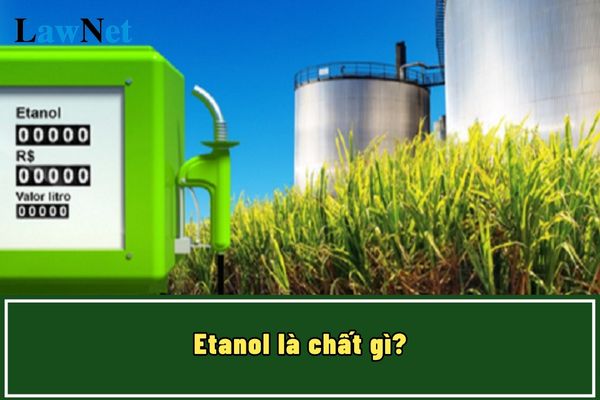What is ethanol? Is it subject to environmental protection tax in Vietnam? What are cases of exemption from environmental protection tax?
What is ethanol? Is it subject to environmental protection tax in Vietnam?
Ethanol, also known as ethylic alcohol, ethyl alcohol, grain alcohol, or simply alcohol, is an organic compound in the alcohol group. It is a colorless, flammable liquid.
Based on Article 3 of the Law on Environmental Protection Tax 2010 regarding the subjects liable to the environmental protection tax, it is stipulated as follows:
Taxable Objects
1. Gasoline, oil, grease, including:
a) Gasoline, excluding ethanol;
b) Aviation fuel;
c) Diesel oil;
d) Kerosene;
đ) Mazut oil;
e) Lubricating oil;
g) Lubricating grease.
2. Coal, including:
a) Brown coal;
b) Anthracite coal;
c) Coking coal;
d) Other coal types.
3. Hydro-chloro-fluoro-carbon (HCFC) solutions.
4. Nylon bags subject to taxation.
5. Herbicides restricted from use.
6. Termiticides restricted from use.
7. Wood preservative chemicals restricted from use.
8. Warehouse disinfectants restricted from use.
9. In cases deemed necessary to supplement other taxable objects suitable for each period, the Standing Committee of the National Assembly will consider and stipulate.
The Government of Vietnam specifies this Article in detail.
Accordingly, it is understood that per the regulation, Ethanol is not subject to the environmental protection tax.

What is ethanol? Is it subject to environmental protection tax in Vietnam? What are cases of exemption from environmental protection tax? (Image from the Internet)
What are cases of exemption from environmental protection tax in Vietnam?
According to Article 4 of the Law on Environmental Protection Tax 2010 regarding objects exempt from the environmental protection tax:
- Goods not specified in Article 3 of this Law are not subject to the environmental protection tax.
- Goods specified in Article 3 of this Law are not subject to environmental protection tax in the following cases:
+ Goods transported in transit or transshipping through Vietnamese borders, including goods transported from exporting countries to importing countries through Vietnam's borders without undergoing import procedures into Vietnam and without undergoing export procedures out of Vietnam; goods in transit through Vietnam's borders based on agreements signed between the Government of Vietnam and foreign governments or agreements between the authorized representatives of the Government of Vietnam and foreign governments according to legal regulations;
+ Goods temporarily imported for re-export within the legally specified period;
+ Goods directly exported by production establishments or entrusted to business export establishments for export, except for cases where organizations, households, or individuals purchase goods subject to environmental protection tax for export.
Additionally, Article 2 of Circular 152/2011/TT-BTC also guides the subjects exempt from environmental protection tax as follows:
- Goods not specified in Article 3 of the Law on Environmental Protection Tax and as guided in Article 2 of Decree 67/2011/ND-CP, Article 1 of this Circular are not subject to environmental protection tax.
- Goods specified in Article 3 of the Law on Environmental Protection Tax and guided in Article 2 of Decree No. 67/2011/ND-CP, Article 1 of this Circular are not subject to taxation in the following cases:
+ Goods transported from the export country to the import country through Vietnam’s borders (transit or transshipment through frontier gates, including those already entered into bonded warehouses) but not completing import procedures into Vietnam and export procedures out of Vietnam.
+ Goods transiting through Vietnam’s borders based on agreements signed between the Government of Vietnam and foreign governments or between the authorized representatives of the Government of Vietnam and foreign governments according to legal regulations.
+ Goods temporarily imported for re-export within the legally specified period.
+ Goods exported abroad by production establishments (including processing) directly or authorized to business export establishments for export, except for cases where organizations, households, or individuals purchase goods subject to environmental protection tax for export.
Based on the customs documentation of the goods, the customs authority processing the customs procedures determines the goods as exempt from the environmental protection tax as stipulated in this section.
Are organizations importing goods subject to environmental protection tax in Vietnam?
Based on Article 5 of the Law on Environmental Protection Tax 2010, it is stipulated as follows:
- Taxpayers of the environmental protection tax are organizations, households, and individuals producing or importing goods subject to tax as prescribed in Article 3 of this Law.
- Taxpayers of environmental protection tax in specific cases are stipulated as follows:
+ In the case of goods importation on a commission basis, the commission-based importer is the taxpayer;
+ In cases where organizations, households, or individuals are the main collectors of small-scale coal mining but cannot present documents proving that taxes on goods have been paid, these organizations, households, or individuals as main collectors are the taxpayers.
Thus, according to the above-stated regulations, organizations importing goods will be among the taxpayers of environmental protection tax if they fall under the taxable subjects as prescribed.

